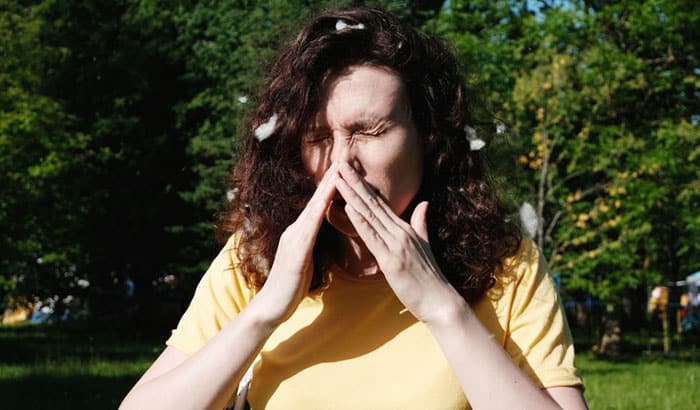Before getting a bird as a pet, there are many things to consider. One of the important questions everyone asks is, “Can you be allergic to birds?”
A quick answer for you is, yes, it is possible, even though it is not very common. Birds are a type of animal that can cause allergic reactions in humans, but they are not the only animals that can do this. In many cases, though, allergic reactions to birds may be milder than allergic reactions to other types of animals.
It is a common misconception that you can’t be allergic to birds. In fact, it has been said that up to 5% of the population suffers from allergies to certain types of bird feathers.
Contents
How to Tell if you are Allergic to Birds?
This allergic reaction is usually characterized by itching and rashes on the skin where contact with the feather occurs. Depending on their immune response and sensitivity levels, some people may react more severely than others.
To find out if you are allergic to birds, we recommend speaking with your doctor about allergy testing or eliminating all contact with them for two weeks to see what symptoms arise without any allergens present.
For example, if someone allergic to cats touches a feather from a bird and then touches their nose or mouth before washing their hands or taking medicine for relief, there could be an allergic reaction because bird feathers carry cat dander with them.
Symptoms of a Feather Allergy
Symptoms of an allergic reaction to birds may include:
- Itchy eyes, nose, and throat
- Hives or rashes on the skin
- Swelling of the lips, tongue, or throat
- Difficulty breathing
- Chest pain
- Sneezing and runny nose
- Coughing
Symptoms may worsen if an individual with bird allergies is exposed to allergens like feathers or dander from a pet bird’s body.
If there are no allergic symptoms, the allergic reaction is not present.
In some cases, an individual may experience a severe allergic reaction called anaphylaxis. Symptoms of this allergic response include:
- Difficulty breathing or speaking due to throat swelling
- Vomiting and diarrhea from gastrointestinal tract swelling
- Feeling lightheaded or faint due to low blood pressure
- If this allergic reaction is not treated, it can lead to loss of consciousness and is life-threatening.
Please see your doctor if you are concerned about bird allergies. Your doctor will identify possible causes of allergic symptoms and discuss treatment options with you. They may refer you to an allergist to diagnose allergic responses that can help identify the specific allergens that trigger your allergic symptoms.
Tips to Reduce the Effects of Bird Allergies
If you are allergic to birds, there are a few things that you can do to reduce the effects of your allergies. Some tips include:
- Keeping your windows and doors closed as much as possible when birds are around
- Wearing sunglasses and a hat when outside to protect your eyes and skin from contact with bird droppings
- Using a nasal spray to help relieve congestion and other symptoms
- Avoiding areas where birds are likely to be congregating, such as parks or ponds
Can you be Allergic to Bird Seeds?
Yes, you can be allergic to birdseed. In truth, birdseed is made up of different types of grains and nuts, so it’s possible to be allergic to any one of them. If you’re allergic to birds, it’s best to avoid contact with birdseed altogether.
Symptoms of an allergic reaction to birdseed can include
- Sneezing
- Watery eyes
- Runny nose
- Rash
There are also ways to reduce your risk of exposure to birdseed if you’re allergic.
For example, try not to handle the seeds directly and wash your hands thoroughly after touching them. You can also wear gloves when spreading it around for the birds to eat.
Take care when preparing birdseed or mixing new batches to avoid allergic reactions. After handling any bird food, be sure to wash your hands immediately with soap and water before touching your eyes, nose, or mouth.
If you have an allergic reaction after coming into contact with birdseed that’s making these symptoms more severe than usual or are experiencing them regularly even if they’ve been mild in the past, consult a doctor right away so he can recommend treatment options accordingly.
Conclusion
It is possible that a person can be allergic to birds, but this is not common. An allergy to animals would often manifest itself as an allergy to their dander or saliva. Rarely does it present itself in the form of feathers and bird droppings.
Though rare, some people do experience reactions when they come in contact with feathers or nesting materials from wild birds, which could trigger itching and sneezing similar to what you’ve experienced while cleaning up after your pet bird.
If you suffer from allergies or were tested for all types of animal allergens, please consult your doctor about other causes for your symptoms.


